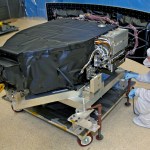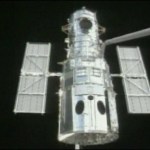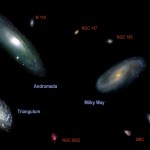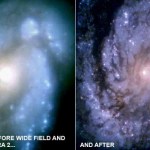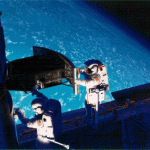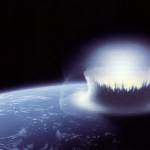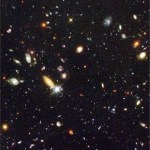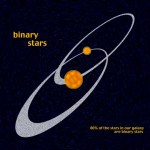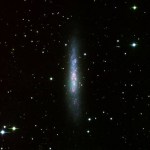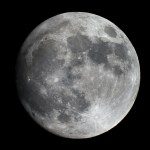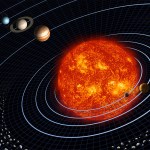
Rather than a real song this week, I instead point you to an internet classic, inspired by those Wilford Brimley commercials you see during The Price is Right. Yes, I watch The Price is Right when I can, and hence I know all about important products like Fibercon, the Scooter Store, Depends, and, of course, Liberty Medical. This video is one of the most bizarre things I've ever seen, and no, I never really noticed how oddly this man pronounces the word diabetes. There is a reason why some now call it "the beetis" in honor of him.
But on a slightly more serious note, even if you have health…
It is done! The longest-running and most famous camera in the world, Hubble's WFPC2, has been removed and replaced. Scientists will now get to use the Wide-Field Camera 3 (below), and WFPC2 is headed to the Smithsonian.
You've already gotten a chance to taste what WFPC2 has done for our understanding of the Universe, Planets, Galaxies, and Clusters of Galaxies in the first four parts of our series on The Camera that Changed the Universe. What else is left?
Part FiveWell, the only thing I didn't cover yet is stars. And yet, perhaps no other tool -- ever -- has been more useful for discovering…
Yesterday, the Space Shuttle Atlantis docked with the Hubble Space Telescope, and now the removal and replacement of WFPC2 has commenced.
As you probably know, I'm going to miss that camera. It's been unveiling the secrets of the Universe for the last 16 years, and in a way that no other camera ever has before. So, you can check out parts one, two, and three in my series of ways that this camera has changed the Universe, and then look below for today's edition of saying goodbye to Hubble's grand old camera, WFPC2.
Part FourOnce in awhile, we get very lucky in the Universe. Instead of looking…
Those of you who are astronomy buffs (or Colbert Report fans) may have heard the news this past January that the Milky Way is just as massive as Andromeda. Colbert even did a special on his show about "America's Galaxy."
Could this be wrong? Could we really be just about the same size? Well, an article came out today by the Italian astrophysicist, Giovanni Carlo Baiesi-Pillastrini, where a brilliant, new technique was used to test this.
Just by watching the tides on Earth, we can figure out what the gravitational tidal forces on our planet are from everything around us, including…
Welcome to part 3 of our goodbyes to the Hubble Space Telescope's WFPC2 (the Wide Field and Planetary Camera 2, pronounced WHIFF-pic-too) instrument. For those of you who missed part one or part two, go ahead and check them out. And for those of you who don't remember, this was the camera that -- back in 1993/4 -- saved the Hubble Space Telescope. There was a "blurring" problem from 1990-1993, and that was the impetus for the service mission and the new, revamped, 610-pound WFPC2 instrument. The before-and-after results were immediate and stunning:
And so I bring you our third installment of…
Yesterday, we started our goodbyes to Hubble's outgoing camera, WFPC2. It was literally 16 years ago that they first installed this workhorse onto the space telescope:
As I write this, the space shuttle Atlantis is up there right now, on a mission to install a new, superior camera. Welcome to part 2 of the five greatest achievements that this camera has ever snapped.
Part TwoYesterday, we looked at the Hubble Deep Field, and the farthest recesses of the Universe. But this camera was great for examining objects much closer to home, too. I point you to the largest planet in our Solar System,…
As I write this, the Space Shuttle Atlantis has just blasted-off a few hours ago, headed for the Hubble Space Telescope. It's hard to believe that Hubble's been up there for more than 19 years now, and has helped revolutionize our understanding of the Universe, from measuring the Hubble constant to discovering Dark Energy. It continues to dazzle us even today.
While you can read about the servicing mission that's going on here, I'm going to focus on saying goodbye to one special instrument this week: WFPC2. (If you want to sound like an astronomer, it's pronounced WHIFF-pic-too.)
This…
This week's song comes from Merle Haggard, one of the greatest story-song writers alive today. There are many great choices, but my favorite Merle Haggard song is the one that -- I think -- tells the best story: The Silver Ghost, a song about a ghost train as told from the perspective of the switchman.
height="25" codebase='http://www.apple.com/qtactivex/qtplugin.cab'>
controller="true" loop="false" pluginspage='http://www.apple.com/quicktime/download/'>
When I was a very little kid, I was always amazed, when we went to visit my Dad's parents, at the huge,…
Let's get something out in the open: not all science fiction is scientifically possible. Some of it is possible, but the laws of nature are pretty strict, and they prevent us from doing a number of things that -- in principle -- would be incredible to do. Examples on both sides, please?
You got it. Wall-crawling like Spider-Man? Totally possible. Just graft enough gecko fibers onto a person and not only will you be climbing walls, but also ice, oily surfaces, and even teflon!
Shrink rays? A la Fantastic Voyage? Completely impossible, unfortunately. Protons, neutrons, and electrons are stuck…
I recently got this comment of incredulity on my article about what wiped out the dinosaurs?
I´m sorry. But i don´t believe this. In my opinion they were wiped out by a climatic changing.
And I think it's worth -- with the help of a little math and physics -- looking at what this asteroid impact might have done.
First off, we need to know how massive this asteroid was. This asteroid was about 10 to 12 km in diameter, which is large, but less than 0.2% the diameter of the Earth. It's pretty unremarkable, and makes it a pretty typical minor asteroid. For comparison, this makes it about half…
One of the most surprising things about the Universe? As vast as it is, it hasn't been around forever. In fact, if you take our plain little rocky home (Earth), it looks like the Universe is only about 3 times as old as we are. It's surprising, considering how huge, expansive, and full of interesting things the Universe is.
And yet, our Sun, Earth, and entire Solar System, at 4.5 billion years, represents a significant fraction of the age of the Universe, about 13.7 billion years.
But how well do we know that number? If you look at the best data, you find that the Universe is 13.73 billion…
In 1862, an under-manned, under-equipped Mexican army defeated the French at the battle of Puebla on May 5th. Cinco de Mayo, started because of this event, has now become a widespread holiday in the US, where awareness and appreciation of Mexico and Mexican culture are of paramount importance.
So before you go out to Chi-Chi's or On the Border or whatever lousy, tasteless, watered-down margarita-hole you plan on going to, I'd like to share with you something real. This is personal, political, and particularly topical in the current economic crisis: this is about labor issues. Know who this…
There's a new scientific paper online today about a very special and rare type of star: an ultracompact X-ray binary star. (One of the authors is surnamed Maccarone.) Let's start by explaining what these things are, how they work, talk about this one in particular, and what it all means. You've heard of binary stars before; these are systems where, instead of having one fusion-burning star in it (like ours), there are two. It turns out that most star system in our galaxy are binaries. If Jupiter were about 70 times more massive, we'd be living in a binary star system ourselves.
Well, let's…
The Universe is full of stuff; both normal matter and dark matter are practically everywhere we look. But the Universe looks as interesting as it does because of what gravity does to it. It takes a Universe that starts out with almost the same exact temperature and density everywhere (the initial differences are one part in about 30,000) and turns it into a web of matter littered with galaxies and clusters of galaxies at the densest places.
But one of the neatest things about this is that the Universe continues to evolve. We know how stars work, and we can tell when galaxies are forming…
Last week, I wrote a little article trying to get people to calm down about the swine flu. Yes, it will get you sick, yes, it's contagious, and yes, if you get it you should seek medical attention. But as of today, the CDC has only three cases of swine flu in my state, and only one swine flu-related fatality in the US.
In other words, the swine flu hasn't affected me or anyone that I know. Until, that is, I went to the hardware store this weekend. I've just moved into a house, and it needs a lot of work. And by that, I mean there are rooms that are unfit for a human presence just yet. So,…
First off, the music for this week comes from a duet known as Rodrigo y Gabriela, two amazing guitarists who team up as a duet and just blow my mind. I discovered them when I was in Tucson, and they are amazing live! (Well, as long as you can find a venue where the audience is quiet enough so you can hear them.) As a decidedly amateur guitar player, here is a combination of two outstanding things: Rodrigo y Gabriela and Stairway to Heaven, one of the greatest guitar songs of all time. Feel free to hit play while you read the rest of the post.
So, following the "Stairway to Heaven" theme, I…
Who is correct here? We don't know, you don't know, it is uncharted territory. Would you bet the entire human history and the existence of our solar system on it?
I wouldn't.
--from a user comment on my old website on the topic of the Large Hadron Collider
Back when all the hype and hoopla concerning the LHC startup had people afraid that the Large Hadron Collider would create a black hole that would eat and destroy the Earth, I tried to quell some of these fears. At my old site, I wrote three articles explaining why the Earth was safe, and why -- even if the worst-case scenario came true…
There are plenty of great sites here on Scienceblogs that have talked about the swine flu, including Aetiology, the Scientific Activist, Greg Laden, Ethics and Science, and Effect Measure, among others.
But I've noticed, reading comments here and elsewhere, that people are really, seriously terrified of this. And yes, it can kill you if you don't take care of it. But what does the swine flu mean for you? Here's my rundown on it:
Swine flu will not kill you if you treat it in time.
You will not be asymptomatic. If you have swine flu, you will have (surprise) flu-like symptoms.
It is about as…
When you look up at the night sky, what's the first and most obvious thing you see? If you answered anything other than "the Moon" you're in serious need of some new eyes, because -- in terms of size, brightness, and detail -- the Moon dominates everything else.
But the one thing you'll always notice about the Moon? We always see the same face. Why is this? There's a simple explanation: all objects in the sky are like spinning tops. But some of them orbit larger bodies, which pull them into gravitational, elliptical orbits. The closer the small body is to the large one, the bigger the…
Everyone knows the Solar System, right? Sun at the center, followed by the four, rocky inner planets, the asteroid belt, the four outer gas giants with their moons, and then the Kuiper belt.
Sometimes Jupiter sends an asteroid headed our way, and sometimes Neptune sends a Kuiper belt object towards us. The ones Neptune sends us are the comets that we see, and the ones Jupiter sends us are asteroids. (Illustration not to scale.)
But many of these Kuiper belt objects are pretty large, such as Pluto and Eris, and there are a total of eight in particular of these trans-Neptunian objects that…

